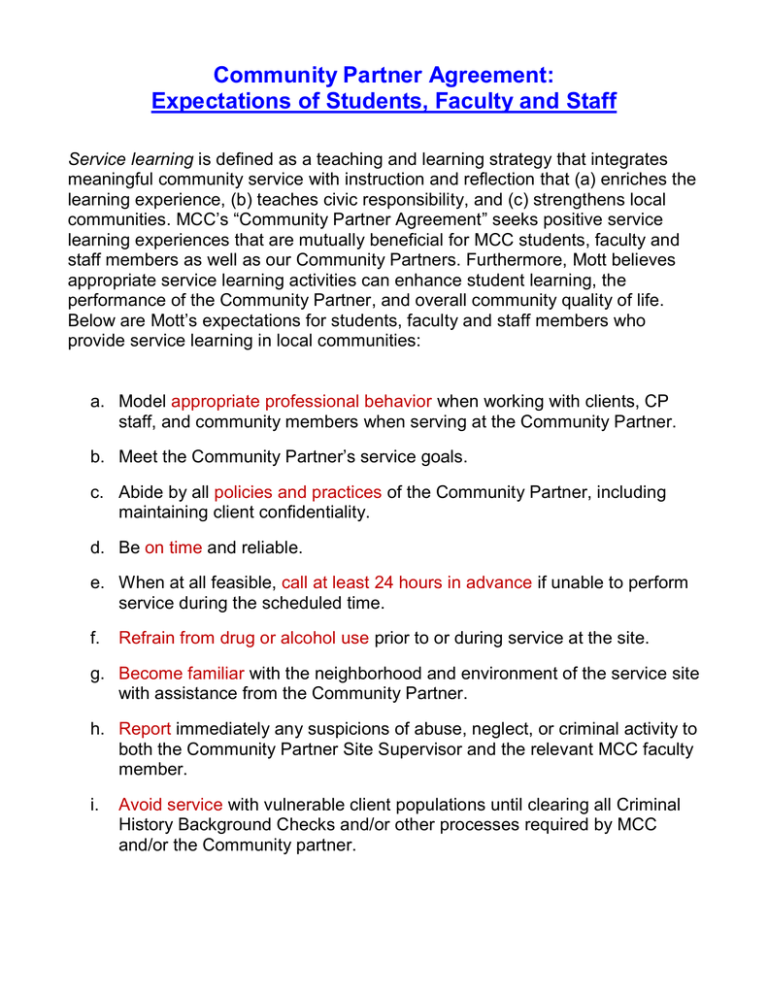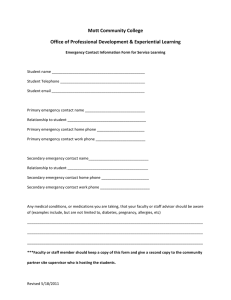Community Partner Agreement: Expectations of Students, Faculty and Staff
advertisement

Community Partner Agreement: Expectations of Students, Faculty and Staff Service learning is defined as a teaching and learning strategy that integrates meaningful community service with instruction and reflection that (a) enriches the learning experience, (b) teaches civic responsibility, and (c) strengthens local communities. MCC’s “Community Partner Agreement” seeks positive service learning experiences that are mutually beneficial for MCC students, faculty and staff members as well as our Community Partners. Furthermore, Mott believes appropriate service learning activities can enhance student learning, the performance of the Community Partner, and overall community quality of life. Below are Mott’s expectations for students, faculty and staff members who provide service learning in local communities: a. Model appropriate professional behavior when working with clients, CP staff, and community members when serving at the Community Partner. b. Meet the Community Partner’s service goals. c. Abide by all policies and practices of the Community Partner, including maintaining client confidentiality. d. Be on time and reliable. e. When at all feasible, call at least 24 hours in advance if unable to perform service during the scheduled time. f. Refrain from drug or alcohol use prior to or during service at the site. g. Become familiar with the neighborhood and environment of the service site with assistance from the Community Partner. h. Report immediately any suspicions of abuse, neglect, or criminal activity to both the Community Partner Site Supervisor and the relevant MCC faculty member. i. Avoid service with vulnerable client populations until clearing all Criminal History Background Checks and/or other processes required by MCC and/or the Community partner. Additional Suggestions / Perspectives for Good Service Learning Etiquette: Be reliable. Show up on time, stay the number of hours you agreed to stay, and do the job you have agreed to do. The Community Partner will be depending on the work you do. Remember, you just might want to use your CP supervisor as a reference in the future! Plan ahead. There is rhythm to student life and the times during the semester that you will be overloaded with school and work are pretty predictable. If you know that you will need time off during midterms and finals to study, let your supervisor know in advance. Agencies understand that students have school commitments and are willing to work with you. Plan ahead so that your agency is not left in the lurch by your absences due to "last minute" crises. Call your supervisor, if you cannot honor your commitment. At most sites the services you provided are essential to the Community Partner and their clients. In other words, the agency is depending on you to be there as agreed. If you cannot work, call your supervisor in time so that other arrangements can be made. Dress appropriately. If you are uncertain how you should dress for your service site, ask your professor and/or supervisor. As a rule of thumb, short shorts, flip-flops, spaghetti straps, t-shirts with suggestive words or images, and other casual clothing is not appropriate at service sites. Be aware some sites have fairly strict dress codes, while others may encourage casual dress. Client confidentiality. The issue of confidentiality cannot be stressed often enough. The service-learning experiences you select may involve clients with interesting histories or personalities. Client information (e.g., names, demographics) is never yours to publicly share, unless it is done in a classroom (e.g., during a discussion or presentation) in a way that does not directly identify the client. Nothing will make you (and Mott’s servicelearning efforts) lose credibility faster than sharing information that should remain confidential. When in doubt, ask your professor and/or supervisor! Photographs. It is always a good idea to ask a supervisor before taking photographs of any kind. Generally speaking, assume it is okay to take photographs of buildings as well as agency staff members and volunteers who provide their verbal consent. You should also assume that it is not okay to photograph clients, their personal property (e.g., artwork) or their living spaces (e.g., a bedroom). Once again, check with the supervisor before taking photographs. Mott Community College Code of Conduct. As representatives of Mott Community College who engaged in college-related activities, students doing service learning in the community also fall under MCC Code of Conduct policies. Prohibited conduct includes: Assault & Battery Weapons Drugs Alcoholic Beverages Disruptive Behavior Endangerment Harassment Discrimination Theft Counterfeiting, Altering Documents, and Impersonating Others Smoking (including e-cigarettes and medical marijuana) Code of Conduct Source: http://www.mcc.edu/18_policies/student_code_of_conduct.shtm You represent present (and future) students at Mott. During service learning activities, please keep in mind you represent Mott Community College. Your actions—the good and the not-so-good—have an impact on how our institution is viewed in the community. Remember that negative experiences with one student during the semester are enough to close opportunities to future students with a given Community Partner.


